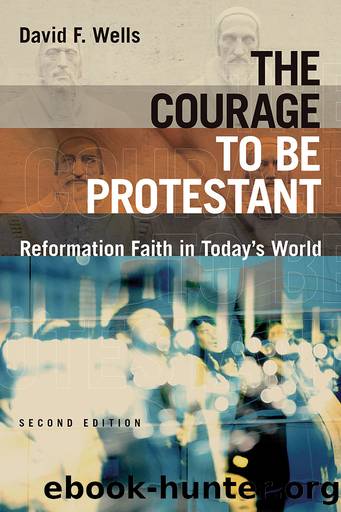The Courage to Be Protestant by David F. Wells

Author:David F. Wells
Language: eng
Format: epub
Publisher: Eerdmans
Virtues to Values
The shift from virtues to values may seem confusing. The problem is that we use these two words interchangeably. We sometimes speak of âmoral valuesâ and have in mind what I have in view here by virtues. Let me clarify.
Virtues
Virtues, as I am thinking of them here, are aspects of the Good. They are the moral norms that are enduringly right for all people, in all places, and in all times. It is true, of course, that there has been debate about what these virtues are. And, needless to say, in our postmodern culture today those who think that there really are moral norms have been largely defeated, at least in the public square. Christian faith, in the early decades of the twenty-first century, is now on cultureâs margin. Nevertheless, even there on the periphery, the matter of virtue is more important than ever. This voice must be preserved. So, how should we think about virtue and why has it been eclipsed?
In ancient Greek philosophy the four most foundational virtues were seen to be wisdom, courage, temperance, and justice. But by the time we enter the Middle Ages these had evolved into a scheme of understanding that was rather more complex. In fact, it placed in inverse correspondence the seven virtues and the seven deadly sins. This match-up was as follows: lust/sexual purity, gluttony/temperance, greed/generosity, sloth/diligence, anger/patience, envy/kindness, and pride/humility.
The Protestant Reformation of the sixteenth century, though, did not look with favor on this classification of the virtues. This was not because they were against virtue or did not see its importance. Rather, they had their eye on how in Catholicism the cultivation of the virtues was seen to form the basis of our acceptance with God. The merit that derived from the practice of these virtues did, of course, have to be upgraded by an infusion of grace. This happened through the sacraments. This is what the Reformers found objectionable. And this is why they insisted that the gospel had to be understood in connection with the solas. In this case, acceptance with God is by grace alone and without any consideration of accrued virtue.
In fact, Scripture itself does not use this kind of classification, though it does speak of the makeup of godliness, of moral excellence (cf. Phil. 4:8; 1 Pet. 2:9; 2 Pet. 1:3). This is the kind of life that reflects the character of God. It is what Scripture speaks about in its narratives, psalms, and didactic sections when it treats of Godâs holiness, justice, mercy, love, and truthfulness. And each of these has multiple variations in its application to human life.
Across the ages people have tried to emulate these virtues. This has been true in Roman Catholicism, as it was in the liberal Protestantism of the nineteenth century. In their slightly different ways, they made the argument, one that has always appealed to the most morally earnest, that people should aim to be virtuous and that by practice they can become so. Luther attacked this notion that, he said, came from Aristotle.
Download
This site does not store any files on its server. We only index and link to content provided by other sites. Please contact the content providers to delete copyright contents if any and email us, we'll remove relevant links or contents immediately.
The Secret Power of Speaking God's Word by Joyce Meyer(3152)
Signature in the Cell: DNA and the Evidence for Intelligent Design by Stephen C. Meyer(3121)
Real Sex by Lauren F. Winner(3001)
The Holy Spirit by Billy Graham(2938)
The Gnostic Gospels by Pagels Elaine(2515)
Jesus by Paul Johnson(2348)
Devil, The by Almond Philip C(2322)
23:27 by H. L. Roberts(2243)
The Nativity by Geza Vermes(2220)
Chosen by God by R. C. Sproul(2155)
All Things New by John Eldredge(2149)
Angels of God: The Bible, the Church and the Heavenly Hosts by Mike Aquilina(1950)
The Return of the Gods by Erich von Daniken(1925)
Angels by Billy Graham(1915)
Knowing God by J.I. Packer(1844)
Jesus of Nazareth by Joseph Ratzinger(1797)
The Gnostic Gospel of St. Thomas by Tau Malachi(1779)
How To Be Born Again by Billy Graham(1775)
Evidence of the Afterlife by Jeffrey Long(1773)
